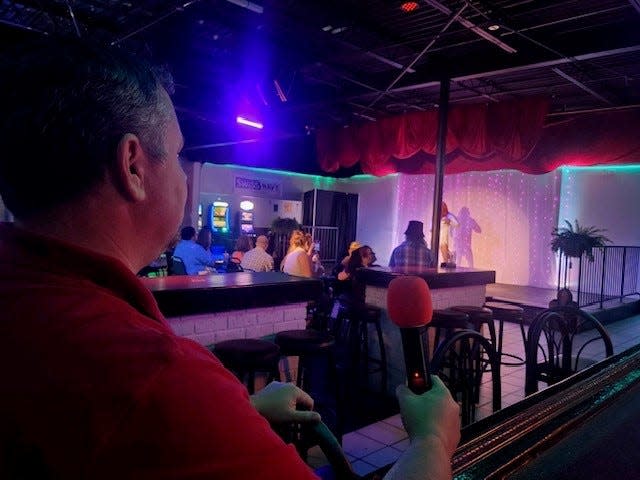Trans, drag debates sowing fear in local communities
Dylan Pontiff was always a trailblazer of sorts, way before he began doing drag performances in Houma, Baton Rouge, and other Louisiana venues.
Now 31, the Lafayette retail worker entered Acadiana High School openly gay and, as a junior there, impersonated Lady Gaga during an academic excellence pep rally, supported by class-mates male and female who respected his openness.
But developments on the political stage have Pontiff questioning whether and when what appears to be growing anti-LGBTQ+ sentiment will result in grave consequences.
“Trump being president opened an avenue for people to express hatred and harm my community,” Pontiff said. “It incites the worst of their kind to maybe go to a nightclub and shoot it up.”
Pontiff is not alone.
While public debate focuses on issues relating to drag performers and transexual people, a growing number of gay men and women in south Louisiana are expressing fears of a backslide from progress made toward tolerance and acceptance.

“He is right on target, he is absolutely correct,” said New Orleans historian Frank Perez, whose books chronicle the history of LGBTQ+ people in the Crescent City. “We know that there are numerous examples from history that words have meaning, that rhetoric is significant.”
FBI statistics show that nearly 1,985 people were victims of hate crimes due to sexual orientation in 2021 nationwide, up from 1,441 in 2020.
None of the FBI statistics included documented hate crimes from Terrebonne or Lafourche, where gay people say they generally experience a “live and let live” attitude, but they fear a change.
Perez, Pontiff and other people interviewed noted that historically drag queens – men dressing publicly in women’s clothes – have caught the brunt of oppressive efforts.
“I think all of us are scared any time we see this,” said Pontiff. “It is crazy that now drag queens are brought into it. Drag queens are the pioneers of our community, a historic pillar of our community.”
Highly recognizable and so ripe for bashing – literally and figuratively –drag queens were at the forefront of major incidents in gay history, including New York City’s Stonewall riots in 1969.
In Houma, a special drag show is planned for April 29. The Rotary Club of Downtown Houma is presenting a fund-raiser starring drag performer Kookie Baker. It promises to be a comedy and music show with a new twist on Bingo.
“It’s a come-together with the community, we don’t want to fight anybody,” said club member Tim McNabb. “It’s for adults 21 and over. We did it as a way to show that in our community everybody belongs, I don’t care how far on the fringes you are.”
McNabb acknowledged that the group’s Facebook page has been the site of some critical comments regarding the show, and that the club has received letters.
At least two were from members of other Houma Rotary clubs.
That is not the case for two night spots in Houma, the Intracoastal Club on East Main Street and Androgyny on Monarch Drive, where drag shows are common.
Clarence Denenea, Androgyny’s owner, fears violence potentials fed by the public debates.
“People are afraid these radicals are going to shoot up a bar, there have been people who have told me that, hearing anti-drag this and that,” he said. “People are afraid nowadays in Houma that they can’t come out and be themselves.”
Denenea’s business model was to build a core gay clientele, but also to make the club a welcome place for all people. He said that initially nearly 200 people packed the place on a Friday or Saturday night, with drag shows as the draw. Some weekend nights featured live music as well.
Now the weekend crowds are down by more than half, Denenea said.
“I have heard of people telling our patrons that place is gay, don’t go there,” Denenea said.
The demonization of drag queens in media and in various state houses is something Houma attorney Michael Billiot said can easily result in actions against gay people.
“When people feel the momentum behind their support for a single individual or politician it is not surprising for them to say let us go for more restrictive laws,” Billiot said. “So, I wouldn’t say I am in fear of it so much as I expect it.”
“Based upon what we know about people’s tendency to turn to violence when they feel the momentum is with them, to show their disdain or hatred toward a group unlike themselves, as though it is okay to do so, I believe that is something we can expect,” Billiot said. “We have to be able to respond to it properly.”
The proper response, Billiot said, is for law enforcement agencies to be prepared, and for LGBT people to do their homework and be able to attack myths with facts.
One reason cited by advocates like Billiot for the volume and breadth of anti-gay sentiment as reported by the news media is ignorance by many people of the differences between transexuals, cross-dressers like drag queens and homosexuals. Derision and myth concerning one group, they suggest, spills over into discussions of others.
The current situation, Dylan Pontiff said, must be addressed in a basic, simple way.
“There needs to be a hard call for action and what we need to do is be registered voters, to make out voices heard that way,” Pontiff said. “Knowing queer people are being affected and finding out they didn’t go out and vote is frustrating. That is when we are supposed to check in. Don’t worry about marches and protests. Get your ass in the voting line.”
The Associated Press contributed to this report.
This article originally appeared on Lafayette Daily Advertiser: Gay people fear future violence in wake of restrictive laws

